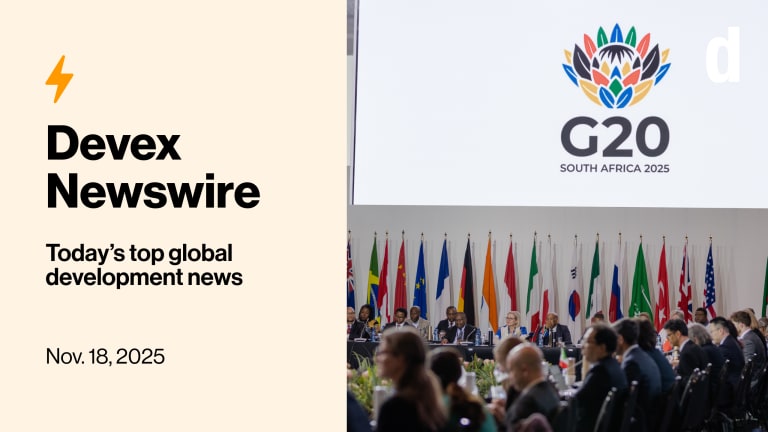
As the global shortage of Oxford-AstraZeneca COVID-19 vaccines deepens, African countries that have already given first doses to populations, might need to restart their efforts, said Dr. John Nkengasong, director at the Africa Centres for Disease Control and Prevention.
The African continent has been heavily dependent on vaccines from the COVAX Facility supplied by the Serum Institute of India. But as the COVID-19 crisis in India spiraled, the country restricted the export of vaccines — severing the facility’s access to these vaccines.
Sign up for Devex CheckUp
The must-read weekly newsletter for exclusive global health news and insider insights.
This week, the institute’s CEO Adar Poonawalla said in a statement that it hopes to restart delivering doses to COVAX and other countries by the end of 2021 — much later than African health leaders were hoping.
Nkengasong recommended during a press conference Thursday that if countries don’t receive doses of Oxford-AstraZeneca vaccines in time to give people their second doses, they should revaccinate those who received first doses of AstraZeneca vaccine with a second, single dose of the Johnson & Johnson vaccine.
He said this should be done in the “event that there is absolute clarity that people will not get their second doses” of the Oxford-AstraZeneca shot.
“There is no harm for those who have received their first doses of AstraZeneca to consider that they can receive, at least, the Johnson and Johnson as an alternative to complete their whole vaccination cycle,” he said. “It will not be necessarily trying to use that to boost AstraZeneca, but just using it as a whole new vaccine. A whole new effort, to just be sure that you close the loop on the full immunization.”
The African Union has secured doses of J&J vaccine for purchase by countries but there has been a slow uptake in orders. Nkengasong also said these doses are not expected to become available until at least August.
COVAX began shipping millions of free doses of Oxford-AstraZeneca to African nations at the end of February. So far, the African continent has received only 18.2 million of the 66 million expected doses through COVAX.
At least 20 million doses of COVISHIELD — the name for the AstraZeneca vaccine produced by Serum Institute of India — are needed for second shots by the end of June, with 5 million doses needed by July, according to Dr. Richard Mihigo, program coordinator for vaccine-preventable diseases at the World Health Organization’s Regional Office for Africa.
WHO’s Strategic Advisory Group of Experts is expected to issue guidance on mixing different types of vaccines amid supply constraints, he said. It is also considering how long the second dose of the AstraZeneca vaccine can be delayed. India’s COVID-19 advisory group has said the gap between COVISHIELD doses can be extended up to 16 weeks.
Though African leaders have worried about how they will secure second doses for their populations given the situation in India, WHO has repeatedly advised countries to use up their stock of COVAX vaccines as first doses on as many people as possible, rather than saving half of them for second doses.
With this crisis in access to vaccines, many African nations are now depending on the donations of vaccine doses from wealthier countries that have hoarded excessive doses, but are committing to sharing vaccines, including the Oxford-AstraZeneca vaccine. The Africa CDC hopes that this will happen in time for people to instead have a second dose of Oxford-AstraZeneca.
“We just hope that this can be done quickly so that we do not run into a gap between now and August when our doses from Johnson & Johnson will begin to kick in,” Nkengasong said.
By the end of June, COVAX is expected to have a shortfall of 190 million doses below its targets. The facility is working to diversify its portfolio of vaccine manufacturers, but WHO Director-General Tedros Adhanom Ghebreyesus urged companies earlier this week to hasten the process of delivery.
Pfizer has committed 40 million doses to COVAX this year, but the majority of these would be in the second half of the year. COVAX is also in discussion with Johnson & Johnson to receive doses in the second half of this year, but this is not finalized.
Moderna has signed a deal for 500 million doses with COVAX, but the majority will be delivered next year. Novavax has also committed to start delivering doses to COVAX in the third quarter of this year.
“As people living in richer countries hit the reset button this summer and their lives start to look normal, in Africa our lives will stay on hold," wrote Dr. Matshidiso Moeti, WHO Regional Director for Africa, in a press release.
Update, May 20, 2021: This article has been updated with details from Dr. Richard Mihigo on vaccine needs and official guidance.



